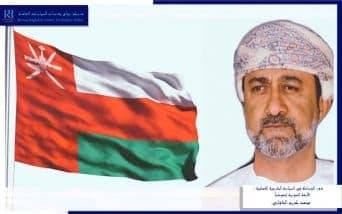The role of mediation in Omani foreign policy: the Syrian crisis as a model.
Muhammad Karim Al-Khakani. Academic and researcher in political affairs.
The foreign policy of each country is linked to its internal stability, which enables it to implement the objectives of its foreign policy. The geographical location of the country constitutes its exceptional importance and its role in the interactions that occur in its regional neighborhood. The geographical location of the country plays a major role in determining the higher directions of its foreign policy. 90% of the oil exported from the Persian Gulf region passes through.
It is not possible to understand Oman’s foreign policy without understanding its geography, as it is characterized by a coastal geography that is connected to the sea, and its coasts are long and wide, and this made it deal with the surrounding countries in a balanced and positive way.
Since the late Sultan Qaboos assumed power in 1970, Oman has been keen to achieve its external goals by guaranteeing the sovereignty and independence of the Sultanate and guaranteeing security and peace in the region as well as respecting the United Nations Charter and emphasizing respect for the sovereignty of states and non-interference in the internal affairs of any state. Thus, the respect of all countries.
The Omani foreign policy is based on goals and principles that have been established within the framework of its movement in the regional and international environment. It was distinguished by its pursuit of moderation and moderation, its keenness to keep all doors open, its relations with countries proceeding normally, and its attempt to reduce tension, escalation and disagreements. For this reason, Oman’s foreign policy was distinguished in the Middle East region and has become its own registered trademark.
The Sultanate of Oman bases its foreign policy on a set of principles, including:
1. The Sultanate is an active and influential element in the regional and international system, and it emphasizes the achievement of Gulf regional security by relying on the capabilities of the Gulf countries.
2. The Sultanate always stands by the right and advocates for it, and calls for achieving this with all peace-loving countries, and seeks to resolve disputes through dialogue and negotiations.
3. The Omani policy is based on the principle of peace, and its implementation must be within the framework of international law, respect for the principles and customs on which it is based, and a spirit of tolerance between different groups and human groups.
4. Not to overlook the historical heritage of the Sultanate, by adopting modernity in a manner consistent with religious and Arab commitment.
5. Adopting a policy of non-interference in the internal affairs of states.
Mediation is defined as (an amicable endeavor that seeks to find a settlement to a dispute by a third country that participates positively in the negotiations between the two conflicting parties, whereby the mediator works to reduce tension between the conflicting parties).
In order for countries to play the role of mediator, they must possess features and conditions that complement each other with each other to play such a role, as the state must possess the skill to gain the confidence of the conflicting parties in order for its mediation to be effective and receive acceptance and success, and for the state to be neutral,
We can summarize the characteristics of the role of mediation diplomacy as follows:
1. The state that plays the role of mediation should enjoy the moral and friendly influence that connects it with the parties to the conflict, and shows its desire to reach a satisfactory solution and settle the dispute between them.
2. The role of the mediator must be based on the facts, as the mediator must have basic and comprehensive information about the dispute and its details, in order for his proposals and recommendations that he will present to be acceptable to the parties to the conflict.
3. The mediator must have a high degree of skill and political acumen, as well as confidentiality, which is an important element in his attempts to succeed and reconcile the conflicting parties.
4. It is necessary to emphasize that whoever is mediating, whether it is a state or an international organization, is not a party to the conflict, and that it is in his interest to resolve the conflict through peaceful means, because any development in not resolving the dispute leads to an impact on his national security.
5. The mediation efforts of the state or the international organization for conciliation remain non-binding on the parties to the dispute, and they are free to accept or reject mediation, except in the case where the peace treaty provides for making the mediating party responsible as the other parties.
The United Nations has worked to strengthen the role of mediation in settling disputes by peaceful means, through conditions that must characterize those who play that role, including: that the mediator has an acceptable legal background, that he is specialized in the matter to be mediated, in addition to his knowledge of the English and French languages, and that he has previous experience in carrying out such work.
After Sultan Qaboos bin Said assumed the reins of power, Omani foreign policy witnessed a new start based on openness to the external environment. The first features of change in its foreign policy were represented by its accession to the United Nations in 1970 and the League of Arab States in 1971. Oman expanded its external activity by sending and receiving diplomatic missions between it and various countries of the world, thus breaking its isolation from the regional and international environment that it had before 1970. The Sultanate of Oman attached exceptional importance to the Middle East region based on the realism that imposed on it to be an original party in the Arab Gulf, as it realizes that maintaining security and stability in it lies with all states, despite the intersections in visions between the Arab Gulf states. For example, Egypt did not deny its signing of the Camp David Accords of 1978, but at the same time it affirmed its standing on the Arab side, and the same was the case with the Iran-Iraq war in 1980. It took the conciliatory path between the two countries.
Among the most prominent files that the Sultanate of Oman played a mediating role in the region were in Syria and the Iranian nuclear file.
The Omani role in the Syrian crisis.
The Omani position regarding the Syrian crisis since its outbreak in 2011 was different from that of the Gulf Cooperation Council countries. Oman rejected armed operations aimed at overthrowing the Syrian regime led by Bashar al-Assad, and called for opening a channel of dialogue between the parties to the Syrian conflict and reaching a peaceful solution to it. Unlike the rest of the Gulf countries, it did not close its embassy in Damascus and kept its ambassador and did not withdraw him as those countries did, and it did not cut off its diplomatic relations with Syria despite the decisions of the Arab League and the Gulf Cooperation Council in this regard. The Sultanate of Oman used to consider the conflict in Syria to be an internal affair, but with the passing of the years since that crisis, what is known as (the Syrian opposition) has become political representation and headquarters in some regional countries such as Turkey and Qatar and it has armed elements on the Syrian soil and with the failure of political solutions and efforts to settle it peacefully, and the emergence of terrorist armed groups not affiliated with the Syrian opposition such as the terrorist organization ISIS and Jabhat al-Nusra and enabling them to impose their control over a large area of Syria, so the Omani view of the Syrian crisis emphasized on The necessity for there to be international consensus, especially within the Security Council, in light of the inability of the Arabs as a region to resolve it and present an initiative that is acceptable to the parties to the conflict in Syria, as the Syrian crisis has become open to all possibilities, and therefore Omani mediation in this context has become useless in the perception of the Omani political leadership, as it has begun to be discussed in the corridors of the United Nations, and in Geneva, and officials in the countries of the world are trying to bridge the points of view between the Syrian parties, and they are presenting initiatives to help them solve their crisis. Oman, based on its experience in restoring security and stability in the Sultanate after it was subjected to a rebellion by the Dhofar Front in 1975 and its full belief in the need to confront terrorist groups in the region, that if the Syrian crisis moved to other countries in the region, it would have negative effects on the rest of the countries, and therefore that experience qualified Oman to play a mediating role and gain the confidence of Damascus to reach a peaceful solution to the crisis, and accordingly, Oman called on all parties to the Syrian crisis to make more efforts to reach a solution Peaceful and agreed upon between the parties to the Syrian conflict (12)0 The Omani Foreign Minister Yusuf bin Alawi visited Syria in October 2015, where he met with Syrian President Bashar al-Assad to discuss peaceful solutions to the Syrian crisis, which is an indication of the extent of confidence that Oman enjoys from the international and regional powers concerned with the Syrian crisis. The Sultanate of Oman has dealt with the Syrian crisis on the basis of its constants in its foreign policy, through which it aims to reach solutions acceptable to its parties that are based on trust, by not taking sides with one party over the other. The Sultanate’s dealings were based on removing the threat from the Arab Gulf region in particular and the general Middle East region. Syria is an area of intersection of interests for some Arab Gulf states on the one hand, and Iran and Turkey on the other, as well as international powers such as Russia and the United States of America, so the Sultanate of Oman was keen To keep all channels of communication open with the parties to the Syrian conflict with the aim of reaching a peaceful solution to it, and to get out of the political impasse that has cost Syrians a lot on various levels, whether economic, social, scientific, cultural and others.







